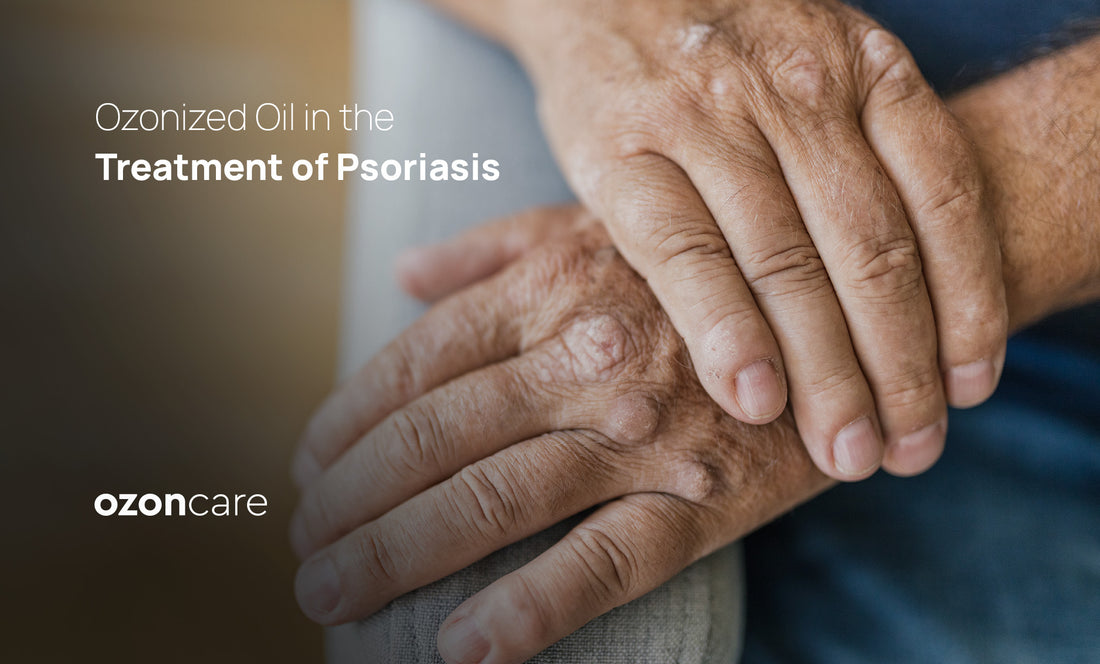
Ozonized Oil in the Treatment of Psoriasis
Psoriasis is a common, recurrent chronic inflammatory skin condition mediated by the immune system, characterized by rapid skin cell growth, blood vessel formation, and infiltration of inflammatory cells. Treatments for psoriasis include topical preparations with corticosteroids, retinoid derivatives, synthetic analogs of vitamin D3, tar, and anthralin, as well as systemic drugs. However, many of these therapies come with significant side effects, such as skin thinning, visible blood vessels, bruising, hair issues, and folliculitis. This raises the question: Could ozonized oil be an effective and safe treatment for psoriasis?
The Potential of Ozonized Oil
Ozone has antimicrobial properties, accelerates blood metabolism, and exhibits anti-inflammatory and immunomodulatory effects, making it applicable for various diseases. Recently, ozone therapy has been explored as a treatment for psoriasis.
The excessive growth and differentiation of basal keratinocytes are critical factors in psoriasis. Proteins such as keratin 6 (KRT6) and keratin 10 (KRT10) play a role in this process. Research suggests that the Tp63 protein regulates keratinocyte proliferation and differentiation and is influenced by oxidative stress. Gao et al. (2020) hypothesized that ozone activates Tp63, increases KRT10 expression, and accelerates keratinocyte differentiation, thus improving psoriatic lesions.
Study Methodology
The study involved twenty patients diagnosed with plaque psoriasis by dermatologists. Ozonized oil was applied to their lesions twice daily for four weeks. Tissue samples from treated and untreated lesions were collected at the Third Xiangya Hospital.
Additionally, a psoriasis-like dermatitis model was created in healthy BALB/C mice. The mice were divided into three groups: a blank imiquimod (IMQ) group, an IMQ + vehicle group, and an IMQ + ozone group. IMQ cream (62.5 mg, 5%) was applied as previously described. For ozone therapy, ozonized oil was applied to the lesions once daily for one week. Morphological changes were photographed and evaluated using Total Sign Scores (TSS). Pathological changes were examined using H&E staining. Protein levels of IL-17, IL-22, Tp63, KRT6, and KRT10 in skin tissues were analyzed by immunohistochemical staining (IHC).
Results
The study found that KRT6, IL-17, and IL-22 protein levels decreased in psoriasis lesions treated with ozone, while KRT10 and Tp63 levels increased in both patients and IMQ-treated mice.
Moreover, Tp63 bound to the KRT10 promoter region, activating its transcription in basal keratinocytes. The effects of ozone on Tp63 and KRT10 were significantly reversed by Tp63 silencing. mRNA expression of TP63 and KRT10 increased significantly with ozone treatment in psoriasis lesions, showing a positive correlation between Tp63 and KRT10 expression in tissue samples. This suggests that ozone induces Tp63 expression, enhancing KRT10 expression and keratinocyte differentiation, thereby improving psoriasis.
Conclusion
The application of ozonized oil appears to be an effective and safe treatment for psoriasis. Ozone promotes keratinocyte differentiation by increasing Tp63-mediated transcription of KRT10, thereby improving psoriatic lesions.
References
Gao, L. et al. (2020). Ozone therapy promotes the differentiation of basal keratinocytes via increasing Tp63-mediated transcription of KRT10 to improve psoriasis. J. Cell. Mol. Med. 24(8), 4819-4829.




